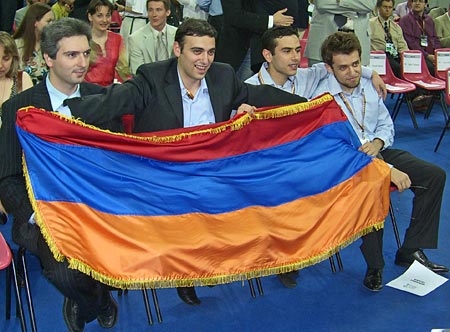Chess
Armenia will make chess a grade school requirement; 2 hours per week for children 6 years old and older. The education ministry claims this will "foster schoolchildren's intellectual development" so they will "think flexibly and wisely."
The program will likely add to an already strong chess playing population in the country, but the small investment in the entire youth of the nation may pay dividends over time. A number of studies show chess improves academic performance in children. Why? Logical thinking and deliberation increase performance in most academic endeavors.
Chess hones skills that have broader application; critical thinking is useful in nearly any context. Perhaps the primary component of good chess playing is anticipating the opponent's moves and forecasting a strategy. Thinking through the consequences of one's actions beyond the next immediate step is a talent the entire world should have, so using the game of chess to help more people think through problems is a good thing.
What the long term impact will be for Armenia is an unprovable unknown, but many nations include chess in grade school education. Improved academic performance may facilitate a "brain drain" effect for a small portion of the population. For the rest, anything that helps expand thinking to a longer term horizon has an effect (however minimal) on some of the most costly social problems. I probably make a stretch in suggesting playing a game as a child will help improve healthcare and decrease criminal activity (there is a long history of crimes directly linked with chess), but the tiny cost to invest in chess makes more sense than many educational methods. Of course, as a chess player I am biased...
The program will likely add to an already strong chess playing population in the country, but the small investment in the entire youth of the nation may pay dividends over time. A number of studies show chess improves academic performance in children. Why? Logical thinking and deliberation increase performance in most academic endeavors.
Chess hones skills that have broader application; critical thinking is useful in nearly any context. Perhaps the primary component of good chess playing is anticipating the opponent's moves and forecasting a strategy. Thinking through the consequences of one's actions beyond the next immediate step is a talent the entire world should have, so using the game of chess to help more people think through problems is a good thing.
What the long term impact will be for Armenia is an unprovable unknown, but many nations include chess in grade school education. Improved academic performance may facilitate a "brain drain" effect for a small portion of the population. For the rest, anything that helps expand thinking to a longer term horizon has an effect (however minimal) on some of the most costly social problems. I probably make a stretch in suggesting playing a game as a child will help improve healthcare and decrease criminal activity (there is a long history of crimes directly linked with chess), but the tiny cost to invest in chess makes more sense than many educational methods. Of course, as a chess player I am biased...


0 Comments:
Post a Comment
<< Home